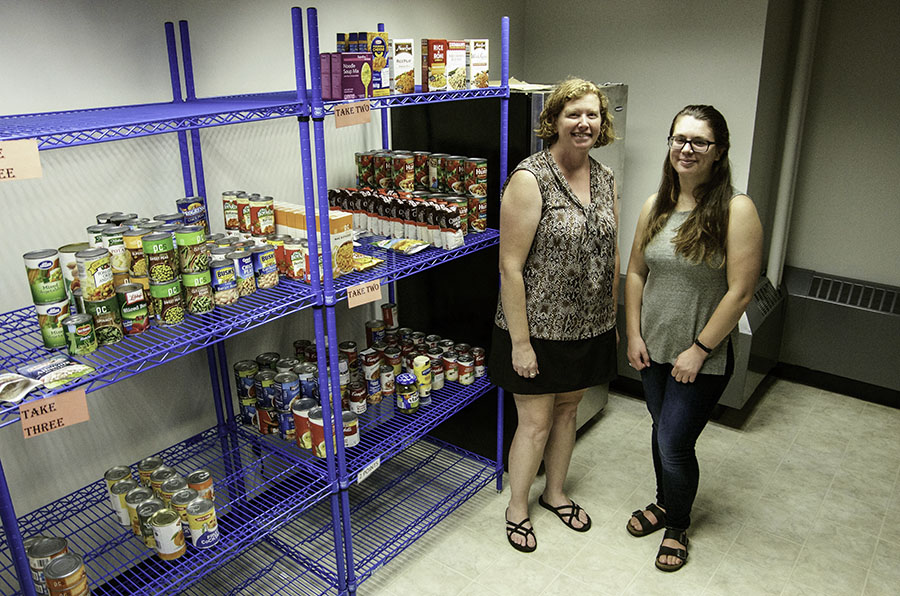On-campus food pantry will serve students
Krista Swahn and Shavonna Bent in the food pantry
The JSC food pantry is ready for those who need it.
Beginning in the fourth week of classes, the pantry will be open to Johnson students between the hours of 11:30 a.m. and 1:30 p.m. every Wednesday and Friday, according to Krista Swahn, the director of student activities and community service.
“We’re hoping that works for commuter students, because it’s during the daytime when they might actually be here,” says Swahn. “And for our on-campus students, if they’re not free on the Wednesday, if they’re free on the Friday that would be great. Eventually we will be adding one evening, but we’re just not quite prepared to do that yet. There’s still a couple of kinks that we have to work out because the Wellness Center isn’t open in the evening.”
The food pantry recently made the move from a small room on the bottom floor of Stearns Hall to a much larger space in the Wellness Center. The move provides the pantry with more space but, for the time being, restricts the hours that it can be in use to fall within the operating hours of the center.
The fall opening and new hours come a few weeks into the semester due to staffing issues. “Since the beginning of the semester it was really just like getting people on board so that we had people to staff it. We finally do have people to staff it,” says Swahn. “We would happily take more volunteers to have the pantry open for other hours. So if people are interested in volunteering to keep the pantry open, or if they want to help out in some sort of way, we will be putting together a student group to actually run this eventually.”
The program is finding its feet in the new semester, after what Swahn describes as a beta test this summer when the program targeted campus and college apartment summer residents. “They were our testing group to see how it would go,” says Swahn, “and it actually went really well.”
This sentiment is echoed by Joey Moye, a sophomore who used the food pantry for the first few weeks of the summer. “It helped a lot. They have some pretty good options and I was able to cook because I was in Martinetti,” says Moye. “If you’re poor, it’s a great option.”
The pantry gives out food based on a points system in order to ensure that all students get what they need. “It’s set up on a 1, 2, and 3-point system,” says Swahn. “A 1-point item is like a side or an ingredient, a can of green beans or tuna, something along those lines. A 2-point item is something that would be good for one meal, like a jar of sauce, a small bag of rice, or a can of soup. And then 3-point items are things that you could get multiple meals out of, so a box of pasta, peanut butter and jelly, things like that. And then the students are allowed to take a certain number of each type of item.”
For Moye, the system has worked just fine, providing the basics he needed. “You could choose four items from number one, and it was like three items from number two, and three items from number three,” says Moye. “With that system, I was usually good for like a week or so.”
The food pantry was initiated to help students overcome the financial barriers that could put their education in jeopardy. “The research is all there,” says Swahn. “We go to great lengths to make sure that kids in elementary school and high school have the food that they need to be prepared for a day at school, and adults are no different. We need to make sure that we’re prepared and we certainly understand that there are barriers to our students, financial barriers, so we’re just trying to help out any way that we can.”
Information on the food pantry will be sent out by email and posted around campus. Swahn seems confident that the information will get to those who need it. “Staff and faculty on campus know that it exists. And I think that we’ll probably get more people through referrals or from people just telling their friends,” she says. “I think that that’s just how Johnson is: when people need something, other people make sure that they get what they need.”



